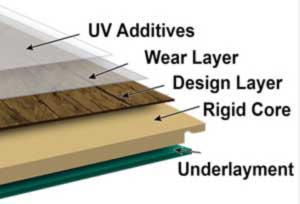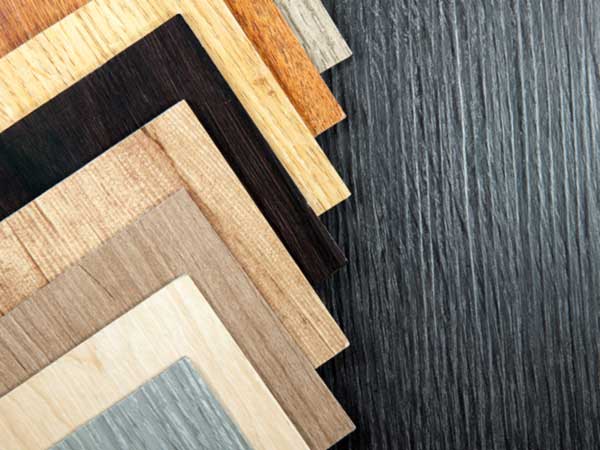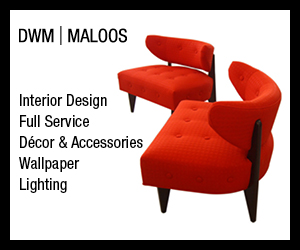SPC vs. WPC LUXURY VINYL FLOORING
You’ve decided you’d like to install luxury vinyl flooring into that room. But wait – before you decide on color and style you need to know the differences between WPC and SPC flooring.
After considering what questions folks had about luxury vinyl flooring this one seemed to come up the most. So, I’ll attempt to answer those questions and explain other acronyms for you here.
Both options are known for being 100% waterproof. SPC vinyl is a newer product with a signature rigid core that is virtually indestructible. WPC vinyl has been the standard for vinyl flooring, and also features a waterproof core, however tends to be more comfortable as well as functional.
SPC and WPC are made differently with their own pros and cons, differences in cost, durability, and comfort. However, both are simply types of Luxury Vinyl Flooring.
What is Luxury Vinyl Flooring (LVT and LVP)?
Luxury vinyl is a type of vinyl flooring. It’s waterproof, and very durable. It costs more than standard vinyl, but still relatively inexpensive. It’s made primarily of plastic—or PVC, to be more accurate.
Luxury vinyl flooring is typically designed to imitate the look of other types of flooring. Luxury Vinyl Planks (or LVP) usually simulate the look of wood. While others mimic the look and feel of tile. These are called Luxury Vinyl Tile (or LVT). Folks often use the term LVT for all types of luxury vinyl flooring, but they are either LVT, or LVP.
Standard Vinyl vs. Luxury Vinyl Flooring
Standard vinyl flooring is sold either in flexible sheets or in square tiles. Standard vinyl consists of a thin backing layer of felt or fiberglass, to which a thin layer of solid vinyl is bonded. This vinyl layer is printed with a design, then covered with a transparent protective coating. Standard vinyl is flexible and quite thin, with a very thin wear layer.
Luxury vinyl is a much different type of flooring than standard vinyl, although they’re both still made with PVC. Luxury vinyl is manufactured in multi-ply planks or tiles with wear layers that range from 2 to 8 mm in thickness (roughly 8/100 to 3/10 of an inch thick). This makes luxury vinyl planks considerably thicker than standard vinyl, giving it a semi-rigid nature.
LVP and LVT flooring are made up of 3 distinct layers:
- A core layer that provides a foundation for the rest of the floor. This layer is typically rigid, or is sometimes flexible, depending on the product.
- A design layer colored or printed to mimic the look and texture of wood or tile.
- A wear layer that protects the floor from fading, scratches, dents, and so on.

There is typically a UV coating on top to protect it from the elements. Also, there is an underlayment beneath the vinyl flooring placed prior to installation for cushion and as a moisture barrier. If your vinyl flooring has attached padding, you will probably not require an underlayment. However, your decision may vary based on the thickness of the planks, type of the subfloor, and your personal preference.
What Is Rigid Core Flooring?
Rigid core flooring is the latest vinyl flooring for today’s demanding consumers. Available in both LVP and LVT, it’s a luxury material that can stand up to a lot of abuse, including water.
Standard vinyl flooring is a fairly thin, flexible material that is glued down to the sub floor. Rigid core is stiffer, thicker and sturdier, which gives it some unique advantages. It is water resistant, but there is much more. It can also handle sub floor imperfections, offers excellent sound insulation and superior comfort underfoot.
Here’s where it gets more technical: The type of advantages you’ll get from luxury vinyl flooring depend on whether you go with a WPC or SPC construction.
What Is WPC?
WPC stands for wood plastic composite flooring, or wood polymer composite flooring. It is a vinyl plank or vinyl tile flooring with a rigid core that’s made from either recycled wood pulp and plastic or polymer composites that are expanded with air. The WPC core is enhanced with a foaming agent, making it slightly softer and more comfortable in addition to being completely waterproof. It is a light weight, low density construction that is warm and soft underfoot with greater comfort.
What is SPC?
SPC stands for stone plastic composite, or solid polymer core. It is a vinyl flooring material that has a rigid core made from powdered limestone, polyvinyl chloride and stabilizers. Sometimes, you might see it referred to as “stone polymer composite flooring.”
SPC flooring is the most durable waterproof vinyl flooring option on the market. It has a similar construction to WPC, but it comes with an ultra-tough core.
Differences Between WPC and SPC Vinyl Flooring?
The key differences is in the rigid core layer.
Like engineered hardwood, and laminate flooring, luxury vinyl plank flooring is constructed from layers of material – as shown above. Layer #3 is the rigid core layer. It’s made from either wood plastic composite (WPC) or stone plastic composite, also referred to as a solid polymer core (SPC). The essential difference between WPC and SPC flooring comes down to the density of that rigid core layer.
Both WPC and SPC flooring are water resistant and incredibly durable to wear caused by high traffic, incidental scratches and everyday life. Overall both can withstand heavy traffic.
WPC is made with wood, and therefore is softer, more forgiving, and absorbs more sound. SPC has a core made with stone which makes it harder and more durable.
WPC consists of a rigid core layer that is thicker and lighter than the SPC core. It is softer underfoot, which makes it comfortable to stand or walk on for longer periods of time. Its thickness can give it a warmer feel and it is good at absorbing sound.
SPC consists of a rigid core layer that’s thinner and more compact and dense than WPC. This compactness makes it less likely to expand or contract during extreme temperature swings, which can improve the stability and longevity of your flooring. It’s also more durable when it comes to impact.
When to Choose WPC or SPC Flooring for your Home
Depending on where you plan to lay your new flooring, selecting the correct construction can make a difference – not a huge difference, but it could be noticeable.
Installing a new floor on a second level might be best to choose WPC, which will better insulate your floors. However, if you’re choosing flooring for home gym or a workshop SPC might be a better choice. Although, if you’re installing flooring in a space where you’ll be standing for long periods of time WPC may be best.
The rule of thumb (I’ve gotten in trouble with) is just pick what you like. If you choose LVT it generally looks like ceramic tile. Tile is meant to be hard. If you choose LVP – that typically simulates the look and feel of wood planks. Therefore, like wood it’s softer.
All types of Luxury Vinyl Flooring has become very popular for it’s durability, and great looks. Either way you can’t go wrong.



